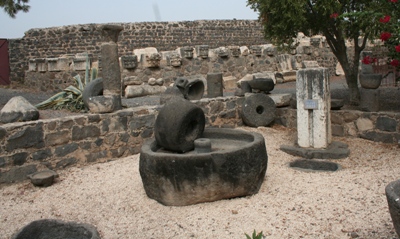 Sunset over the Hudson River (Photo by Dan Voll)
Sunset over the Hudson River (Photo by Dan Voll)
(Isaiah 53:3)
I was thinking about the verse from the Psalms that says, “Deep calls to deep in the roar of your waterfalls; all your waves and breakers have swept over me.” (Psalm 42:7) It is all too easy for us to dwell on the surface of things. Even as believers, we can miss so much by not entering into a deeper understanding of what is going on around us, especially when suffering or sorrow are involved. In John 11, when Martha came up to Jesus to tell Him, “Lord, the one you love is sick,” what she said was accurate. Jesus greatly loved Lazarus.
Jesus responded to Martha, “This sickness will not end in death. No, it is for God’s glory so that God’s Son may be glorified through it.” Though Jesus knew exactly what God was going to do in this circumstance, He did not spare himself. He entered fully into the sorrow of Mary and Martha, and of the Jews who were also grieving at the death of Lazarus. One of the loveliest and shortest verses in the Bible appears later in chapter 11. “When Jesus saw her weeping and the Jews who had come along with her also weeping, he was deeply moved in spirit and troubled. ‘Where have you laid him?’ he asked. ‘Come and see, Lord,’ they replied. Jesus wept.”
As the Son of God, Jesus could have been above it all, rejoicing and simply declaring that God was going to raise Lazarus from the dead. He could have spared himself the pain and sorrow, but as the Son of Man, he did not. In fact, even as the Son of God, he enters into our sorrows and griefs far more often than we know. There are many circumstances in our lives that God cares about much more than we do. All too often, we fail to see what it is that He is so concerned about!
God does not want us to dwell on the surface of things, but to enter into genuine love and concern for others, especially for our brothers and sisters in Christ. “Love one another with a pure heart fervently” is an easy verse to read, but an exceedingly difficult command to fulfill. How often we treat our families or companions like “ships passing in the night.” We are all bothered about our own cares and needs, but oblivious to the needs of those around us! Instead, the Lord calls us to have a genuine daily concern for others.
Someone could well have accused Jesus of wasting time visiting the likes of Zacchaeus, or Simon, the Pharisee at whose house He was anointed by Mary. Why did He spend so many hours eating and talking with “publicans and sinners”? Because He loved them and viewed the time spent with them as an opportunity to reach as many as could be reached with the things that really matter. Jesus preached the Gospel publicly, but that is not all that He did! Very often, he simply spent time with people, took up their cares and needs, and met them right where they lived.
How much time do we spend with those nearest us—talking, praying, cooking, cleaning, showing care and concern by what we do? I know that I am prone to get overly involved in projects—painting, or carpentry, or gardening—but God has been teaching me that His main concern is for people. It is people who will live forever, long after the paint has peeled, or the rhododendron has ceased to bloom. We also need to enter deeper into the cross! Dwelling there, we can gain greater understanding of God’s love for people, and what that love cost Him. We need to receive revelation regarding the deeper dimensions of life. Suffering, pain, and sorrow are very real in this world. Not turning our backs when we see suffering will help us come to a deeper understanding of God and life itself, something that happier circumstances cannot provide. We do not fully understand the recent death of our dear brother in Christ, Nathaniel Nash, The New York Times European economic correspondent. He died in the plane crash in Croatia with Commerce Secretary Ron Brown on April 4, 1996. Yet we can ask the Lord for ears that are open to what He is saying through it all, and for hearts that are attuned to His purposes.
Think for a moment about missionaries like Gladys Aylward or Bruce Olson, and the sufferings they have borne for peoples whom the Lord has put on their hearts. It is all too easy for a Christian to walk up to such a person and say, “Everything will be all right. God is on the throne, and He will work out his purposes for China,” or wherever, yet not have a clue about the price such missionaries pay for every inch of ground they take for the Kingdom of Heaven.
Who can understand the suffering of a person better than the one who is suffering? Think for a moment about Job and his friends. Job, Bildad, Eliphaz, and Zophar were four men with genuine spiritual wisdom and knowledge. They all knew a great deal about God, and in fact knew Him personally. Nevertheless, when Job entered into indescribable suffering, his friends totally missed the point of what was happening. Rather than admitting that they really did not know why God had allowed such a righteous man to suffer so much, they heaped criticisms upon their friend, adding “sorrow to his sorrow.” They could have said to Job, “We don’t know what is going on or why, but we will stand with you for all that God is doing.” Instead, they became Job’s accusers and tormentors and failed to see that God was very much at work in their friend’s sorrows.
How often today, influenced perhaps by “health and wealth” teachings (Job lost both in his test), do believers point at someone suffering cancer or some other trouble, and tell that person that it is his or her own fault? “You don’t have enough faith!” or, “You must have done something wrong!” Do you realize that God entrusts suffering to some people, that He knows that He can allow them to go through difficulty without having them turn against Him? God actually advances the purposes of His kingdom through the trials His children pass through! Yes, there is self-pity in some of Job’s words and there is complaining as well. But in the middle of all the pain, Job reaches out to God and speaks gems of truth that will last forever.
 Olive Press from Ancient Israel (Photo by Dan Voll)
Olive Press from Ancient Israel (Photo by Dan Voll)
Could Job have spoken such prophetic words concerning the Messiah as he did in Job 19 if he had never suffered what he suffered? I doubt it! In the Bible, olive oil is symbolic of the Holy Spirit, but the only way to extract the oil out of olives is to subject them to great pressure. Similarly, if you never crush grapes, you will never get wine. Remember the difficulties that Jeremiah, Isaiah, and other prophets passed through: “I am the man who has seen affliction by the rod of his wrath. He has driven me away and made me walk in darkness rather than light; indeed, he has turned his hand against me again and again, all day long.” (Lamentations 3:1-3) The words of these suffering prophets were costly, spoken through fire and sorrow. They are therefore also words of great value.
Job was close to the truth when he said in chapter 19, verse 13, “He has alienated my brothers from me.” God was not to blame for what happened, but He allowed it to happen because greater things would be gained by the difficulties Job passed through than could be accomplished by any other means. Job continued: “My acquaintances are completely estranged from me. My kinsmen have gone away; my friends have forgotten me. My guests and my maidservants count me a stranger; they look upon me as an alien. I summon my servant, but he does not answer, though I beg him with my own mouth. My breath is offensive to my wife; I am loathsome to my own brothers. Even the little boys scorn me; when I appear, they ridicule me. All my intimate friends detest me; those I love have turned against me. I am nothing but skin and bones; I have escaped with only the skin of my teeth.”
Job is not exaggerating here. He is speaking the truth! His friends accused him of complaining, but his description of his circumstances is an accurate one. The more those friends continued to speak against him, however, the farther their accusations strayed from the facts. They began to accuse a righteous man of all kinds of evil and said at one point, “Surely such is the dwelling of an evil man; such is the place of one who knows not God.” (Job 18:21) But Job did know God, and responded to his friends in chapter 19:2, “Have pity on me, my friends, have pity, for the hand of God has struck me. Why do you pursue me as God does? Will you never get enough of my flesh?” Could not these friends have put themselves in Job’s place for a little while? Could they not consider for a moment how they would have felt if they had lost all their children, their house, their property, and if their own dear wife had turned against them? The Bible commands, “Rejoice with those who rejoice, mourn with those who mourn.” This is not a feigned rejoicing or mourning, but a genuine entering into the experience of another person. That is what love is all about!
Thereafter, Job rises from his complaint to speak the prophetic words, “Oh, that my words were recorded, that they were written on a scroll, that they were inscribed with an iron tool on lead, or engraved in rock forever! I know that my Redeemer lives, and that in the end he will stand upon the earth. And after my skin has been destroyed, yet in my flesh I will see God; I myself will see him with my own eyes—I, and not another. How my heart yearns within me!” Do you see the depths of understanding that God was working into Job’s soul by the sufferings he passed through? Consider how long these words have endured since the day that Job spoke them, and how many lives have been touched by them!
Job also speaks words of wisdom to his friends, calling them to consider their ways: “If you say, ‘How we will hound him, since the root of the trouble lies in him,’ you should fear the sword yourselves; for wrath will bring punishment by the sword, and then you will know that there is judgment.” In fact, God was very upset with Job’s friends as is revealed later in the story. How easy it is to criticize a believer in Christ who is passing through a difficult time, but do we really understand what God is doing in his or her life? Are we truly aware of our own needs and shortcomings, or do we dwell on the surface of things, judging by appearances?
How do we get to the place of understanding the deep things of the Lord? One way is to take the risk of loving other people for Christ’s sake, especially those who are suffering, to take hold of His concern for them and make it our own. This is neither an easy nor an inexpensive thing to do, but it bears fruit that will last forever. Nothing that is of eternal value is easy, as Job reveals in the 28th chapter when he describes the miner who spares no cost or exertion to dig deep down into the earth for hidden treasures (see Job 28:1-11). Job himself was flattened to the ground by what happened to him, but he did not remain groveling in the dust. He dug deep down to the bedrock of what he was passing through, so that He could take hold of what God was doing through it all. “But if I go to the east, he is not there; if I go to the west, I do not find him. When he is at work in the north, I do not see him; when he turns to the south, I catch no glimpse of him. But he knows the way that I take; and when he has tested me, I will come forth as gold.” (Job 23:8-10)
Job continues later in Chapter 28 by describing what he is really talking about, not mining for gold or silver or rubies, but for wisdom:
Where then does wisdom come from? Where does understanding dwell? It is hidden from the eyes of every living thing, concealed even from the birds of the air. Destruction and Death say, ‘Only a rumor of it has reached our ears.’ God understands the way to it and he alone knows where it dwells, for he views the ends of the earth and sees everything under the heavens. When he established the force of the wind and measured out the waters, when he made a decree for the rain and a path for the thunderstorm, then he looked at wisdom and appraised it; he confirmed it and tested it. And he said to man, ‘The fear of the Lord—that is wisdom, and to shun evil is understanding.'”
In this passage, Job describes wisdom as something that cannot be gotten from men, or bought with any amount of riches. Then, long before Solomon was born, he states, “The fear of the Lord—that is wisdom, and to shun evil is understanding.”
Oh, that our fallen human nature was teachable enough to learn the great lessons of life in the good times! But God knows us better. He knows that we learn wisdom best and see life from an eternal perspective only when we pass through the depths of trial, temptation, persecution, and suffering. Souls who live all their lives in the safety of shallow waters remain shallow souls. Quoting again the passage we began with in Psalm 42, David states of his trials, “Deep calls to deep in the roar of your waterfalls; all your waves and breakers have swept over me.” But then he continues with words that have comforted and encouraged millions of suffering souls to this day, “By day the Lord directs his love, at night his song is with me—a prayer to the God of my life.”
If we follow hard after the Lord to know Him, He will give us understanding about the “big picture,” what really matters in life. By contrast, the devil is a master at using “details,” albeit distorted ones, to obscure the big picture. What really matters is people: our families, our roommates, and those around us every day. Though we may not see it, God never forgets this fact. He is always about the work of gathering people to Himself, people who will dwell with Him forever. Are we willing to become co-laborers with Him in that great work of building His church, the Body of Christ?
Are we willing to respond from the depths of our souls to the deep call of God? Are we willing for His “waves” and “billows” to sweep over us? Will we let Him refine us and bring us into a deeper relationship with Himself? And will we let Him fill us with a deeper love for others, and give us a deeper understanding of life itself, in all its aspects?
Copyright ©1996 Christopher N. White, Revised 2008.

